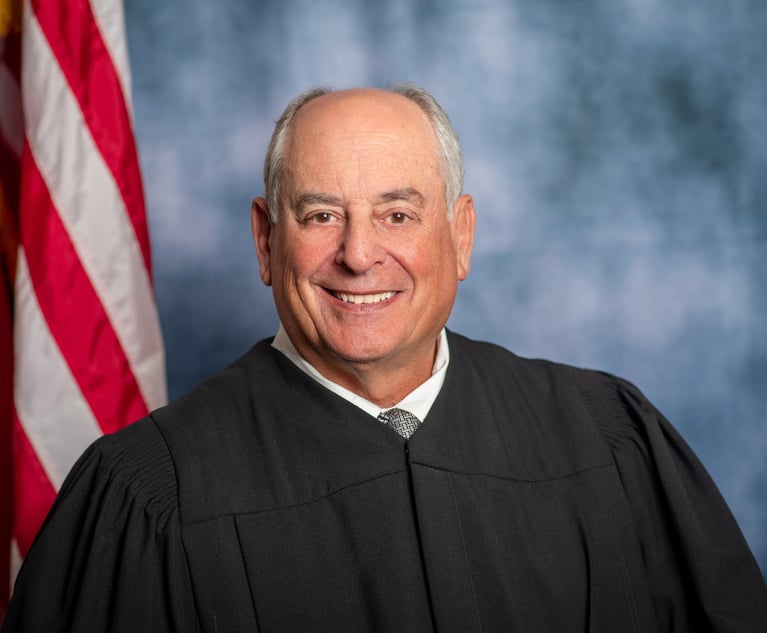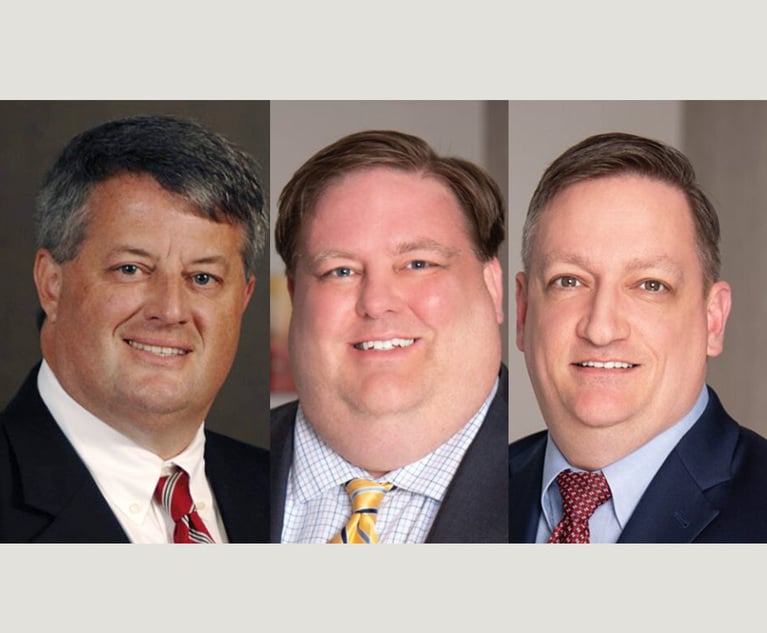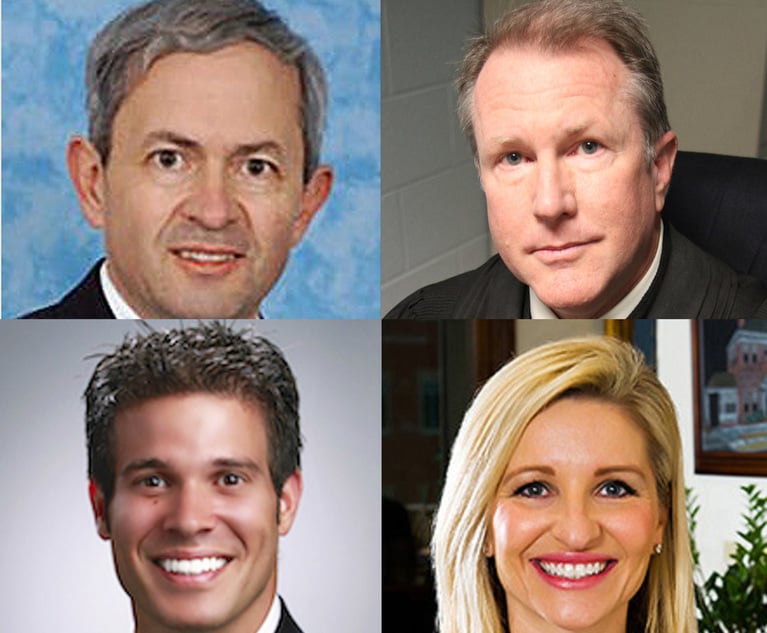 Shari Klevens (left) and Alanna Clair, Dentons. (Courtesy photo)
Shari Klevens (left) and Alanna Clair, Dentons. (Courtesy photo)Watch Out for Gray Ethical Areas When Defending Your Client in Deposition
Prepare witnesses, properly and know the local rules on conferring with your client.
May 24, 2019 at 10:51 AM
6 minute read
Legal industry publications often report on instances in which aggressive attorneys are sanctioned or penalized for crossing the line when taking a deposition. Attorneys are advised against bullying witnesses, attacking opposing counsel or conducting a deposition in a way that violates the ethical rules. However, there also are rules that govern the attorney who is defending the witness at a deposition—obligations that often arise before the deposition even begins.
Indeed, appropriate deposition conduct typically involves more than just refraining from engaging in contentious conduct with opposing counsel. Below are some tips and guidance for attorneys regarding interactions with their own witnesses before and during depositions.
Preparing Witnesses to Testify
Whether a deposition ultimately involves heated arguments between counsel or a frustrated witness who lashes out (harming that party's claims or defenses) can be a direct result of the scope and depth of the defending attorney's preparation of that witness.
Preparing any witness for deposition is an important part of an attorney's role as a zealous advocate, but knowing the boundaries of acceptable preparation is equally important. Most attorneys facing this issue are wary of their ethical obligations when preparing a witness for deposition. Questionable or even sanctionable conduct can arise long before the witness takes the oath and testifies.
Indeed, predeposition meetings, while beneficial and often necessary regardless of whether the witness is testifying as a corporate representative or an individual, also can create risk. It can be tempting for attorneys to improperly “coach” a witness. Further, assisting a witness in fabricating responses to anticipated questions or implicitly suggesting that the witness withhold or alter the truth likely runs afoul of the attorney's duty of candor.
Rule 3.3 of the Model Rules of Professional Conduct states that a “lawyer shall not knowingly … offer evidence that the lawyer knows to be false. If a lawyer … has offered material evidence and the lawyer comes to know of its falsity, the lawyer shall take reasonable remedial measures.” Comment [1] to the rule states that Rule 3.3 applies whenever the lawyer is representing a client in an ancillary proceeding, such as a deposition. Thus, a lawyer is required “to take reasonable remedial measures if the lawyer comes to know that a client who is testifying in a deposition has offered evidence that is false.”
If a client testifies falsely (and the attorney knows that the testimony is false), comment [10] to the rule describes the “reasonable remedial measures” that the attorney must take. The lawyer must first “remonstrate with the client confidentially, advise the client of the lawyer's duty of candor to the tribunal and seek the client's cooperation with respect to the withdrawal or correction of the false statements or evidence. If that fails, the advocate must take further remedial action,” including withdrawal or disclosure to the tribunal as necessary (even if that requires disclosing confidential information).
Learn the Rules
Before attending a deposition, it is also helpful to review the relevant rules governing deposition scope, nature of objections and related motions. Without the presence of a judge in the room, attorneys are expected to self-regulate and conduct the deposition as they would at trial under the rules of evidence. Identifying and understanding the relevant rules is essential to ensuring compliant deposition conduct.
Many courts have local rules that govern discovery; some even have specific guidelines or instructions relating to depositions. Moreover, Rules 30 and 32 of the Federal Rules of Civil Procedure set forth the type and nature of permissible objections, provide the basis for motions to terminate or limit a deposition and address waiver of certain objections.
Conferring During Depositions
One gray area for the deposition that often varies by jurisdiction is whether the defending attorney may confer with the deponent during the deposition. Some courts follow Hall v. Clifton Precision, 150 F.R.D. 525 (E.D. Pa. 1993), which draws a bright line, “no conference” rule. The Hall court reasoned in part that “private conferences … tend, at the very least, to give the appearance of obstructing the truth.”
On the other hand, most jurisdictions follow a less strict approach, prohibiting conferences only when a question is pending. That is because permitting conference while a question is pending could result in an attorney coaching a witness in how to testify. Other jurisdictions permit conferences during deposition breaks but caution that the subject matter discussed is discoverable unless otherwise privileged. Some courts have entered orders containing deposition guidelines that prohibit private conferences between deponents and their attorneys during the actual taking of the deposition, except for the purpose of determining whether a privilege should be asserted.
If the court or jurisdiction is silent on the matter, though, Rule 3.4 of the Model Rules of Professional Conduct prohibits assisting a witness to testify falsely or to obstruct another party's access to evidence. Comment [1] to that rule notes that “improperly influencing witnesses” is a threat to fairness in the adversary system.
If further instruction would be helpful to the parties to litigation, they can consider whether to request that the court enter an order setting forth deposition guidelines that address attorney-client conferences during a deposition.
Knowing the rules is one thing. Following them is another. Although it may be difficult to determine the best course of conduct in the gray areas, the risk of not following the rules is high. Unethical conduct can result in sanctions, a deposition do-over, embarrassment and an unhappy client. Thus, it is helpful for attorneys to focus on their ethical obligations for defending witnesses at deposition.
Shari L. Klevens is a partner at Dentons US in Atlanta and Washington, D.C., and serves on the firm's U.S. board of directors. She represents and advises lawyers and insurers on complex claims and is co-chair of Dentons' global insurance sector team.
Alanna Clair, also a partner at Dentons US in Washington, focuses on professional liability and insurance defense. Klevens and Clair are co-authors of “The Lawyer's Handbook: Ethics Compliance and Claim Avoidance” and the upcoming 2020 edition of “Georgia Legal Malpractice Law.”
This content has been archived. It is available through our partners, LexisNexis® and Bloomberg Law.
To view this content, please continue to their sites.
Not a Lexis Subscriber?
Subscribe Now
Not a Bloomberg Law Subscriber?
Subscribe Now
NOT FOR REPRINT
© 2024 ALM Global, LLC, All Rights Reserved. Request academic re-use from www.copyright.com. All other uses, submit a request to [email protected]. For more information visit Asset & Logo Licensing.
You Might Like
View All
'A 58-Year-Old Engine That Needs an Overhaul': Judge Wants Traffic Law Amended
3 minute read
Fulton Jury Returns Defense Verdict After Pedestrian Killed by MARTA Bus
8 minute read
'The Best Strategy': $795K Resolution Reached in Federal COVID-Accommodation Dispute
8 minute read
Population and Caseload Boom Birth New West Georgia Judicial Circuit
7 minute readTrending Stories
- 1'Largest Retail Data Breach in History'? Hot Topic and Affiliated Brands Sued for Alleged Failure to Prevent Data Breach Linked to Snowflake Software
- 2Former President of New York State Bar, and the New York Bar Foundation, Dies As He Entered 70th Year as Attorney
- 3Legal Advocates in Uproar Upon Release of Footage Showing CO's Beat Black Inmate Before His Death
- 4Longtime Baker & Hostetler Partner, Former White House Counsel David Rivkin Dies at 68
- 5Court System Seeks Public Comment on E-Filing for Annual Report
Who Got The Work
Michael G. Bongiorno, Andrew Scott Dulberg and Elizabeth E. Driscoll from Wilmer Cutler Pickering Hale and Dorr have stepped in to represent Symbotic Inc., an A.I.-enabled technology platform that focuses on increasing supply chain efficiency, and other defendants in a pending shareholder derivative lawsuit. The case, filed Oct. 2 in Massachusetts District Court by the Brown Law Firm on behalf of Stephen Austen, accuses certain officers and directors of misleading investors in regard to Symbotic's potential for margin growth by failing to disclose that the company was not equipped to timely deploy its systems or manage expenses through project delays. The case, assigned to U.S. District Judge Nathaniel M. Gorton, is 1:24-cv-12522, Austen v. Cohen et al.
Who Got The Work
Edmund Polubinski and Marie Killmond of Davis Polk & Wardwell have entered appearances for data platform software development company MongoDB and other defendants in a pending shareholder derivative lawsuit. The action, filed Oct. 7 in New York Southern District Court by the Brown Law Firm, accuses the company's directors and/or officers of falsely expressing confidence in the company’s restructuring of its sales incentive plan and downplaying the severity of decreases in its upfront commitments. The case is 1:24-cv-07594, Roy v. Ittycheria et al.
Who Got The Work
Amy O. Bruchs and Kurt F. Ellison of Michael Best & Friedrich have entered appearances for Epic Systems Corp. in a pending employment discrimination lawsuit. The suit was filed Sept. 7 in Wisconsin Western District Court by Levine Eisberner LLC and Siri & Glimstad on behalf of a project manager who claims that he was wrongfully terminated after applying for a religious exemption to the defendant's COVID-19 vaccine mandate. The case, assigned to U.S. Magistrate Judge Anita Marie Boor, is 3:24-cv-00630, Secker, Nathan v. Epic Systems Corporation.
Who Got The Work
David X. Sullivan, Thomas J. Finn and Gregory A. Hall from McCarter & English have entered appearances for Sunrun Installation Services in a pending civil rights lawsuit. The complaint was filed Sept. 4 in Connecticut District Court by attorney Robert M. Berke on behalf of former employee George Edward Steins, who was arrested and charged with employing an unregistered home improvement salesperson. The complaint alleges that had Sunrun informed the Connecticut Department of Consumer Protection that the plaintiff's employment had ended in 2017 and that he no longer held Sunrun's home improvement contractor license, he would not have been hit with charges, which were dismissed in May 2024. The case, assigned to U.S. District Judge Jeffrey A. Meyer, is 3:24-cv-01423, Steins v. Sunrun, Inc. et al.
Who Got The Work
Greenberg Traurig shareholder Joshua L. Raskin has entered an appearance for boohoo.com UK Ltd. in a pending patent infringement lawsuit. The suit, filed Sept. 3 in Texas Eastern District Court by Rozier Hardt McDonough on behalf of Alto Dynamics, asserts five patents related to an online shopping platform. The case, assigned to U.S. District Judge Rodney Gilstrap, is 2:24-cv-00719, Alto Dynamics, LLC v. boohoo.com UK Limited.
Featured Firms
Law Offices of Gary Martin Hays & Associates, P.C.
(470) 294-1674
Law Offices of Mark E. Salomone
(857) 444-6468
Smith & Hassler
(713) 739-1250






